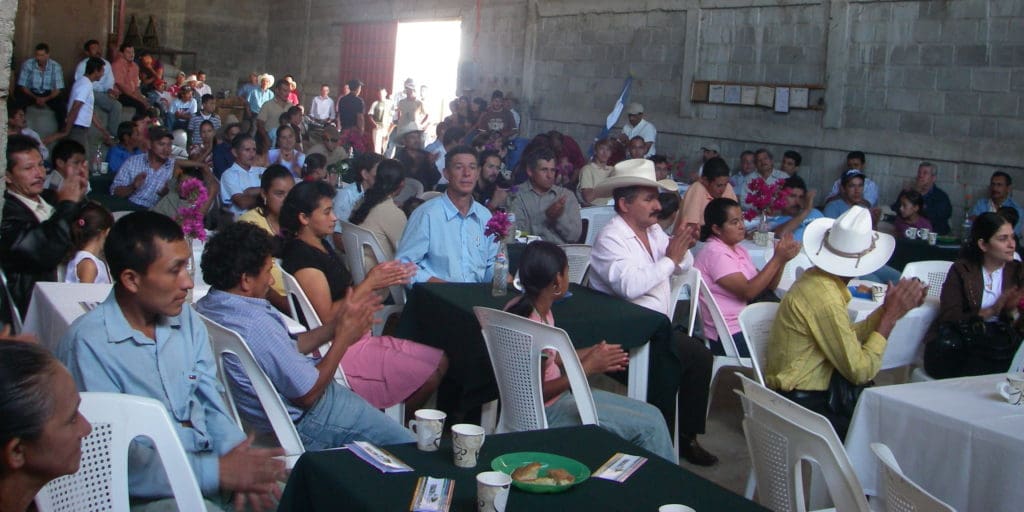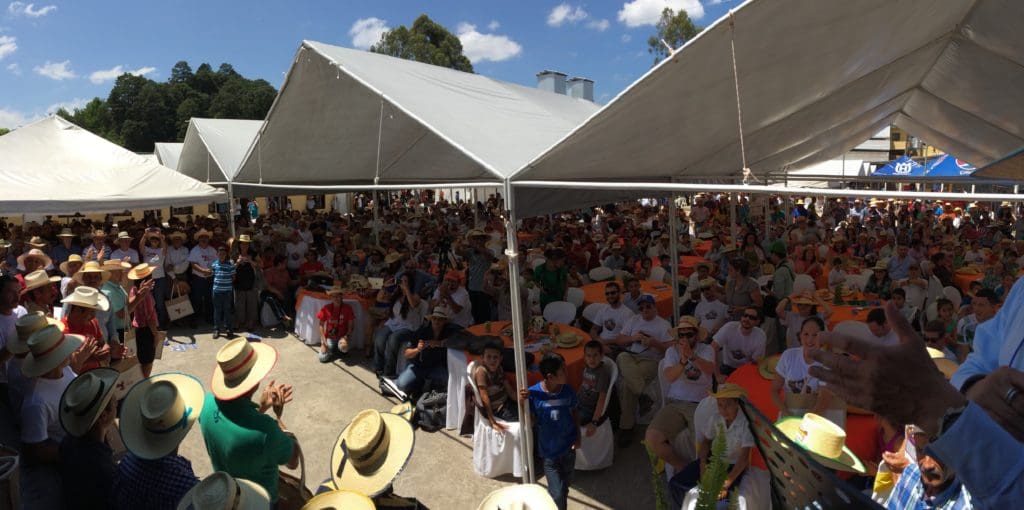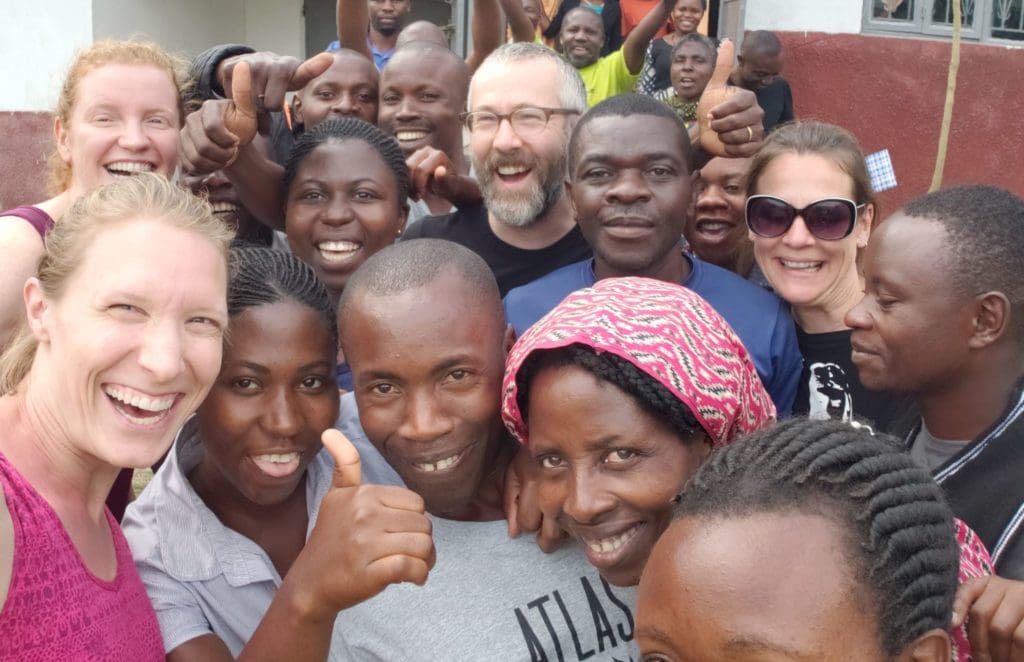We Atlasians see a lot of value in bringing our coffee supply chain partners together to honor the work of microlot producers whenever possible. We do this in a variety of ways, including open cuppings here in the Atlas lab, cupping at origin with roasters and exporters, and – whenever possible – holding community microlot competitions at origin.
We started holding microlot cupping competitions in 2007 with the folks at COCAFCAL in Capucas, Honduras. For that event, we held the competition in our cupping lab while co-op members watched a live feed from their coffee warehouse in Honduras.

2008: Members of Las Capucas at their warehouse, watching the competition take place in the Atlas lab.
I guess we were giddy with the thrill of technology, because it was kind of a funky setup; the growers staring anxiously at a computer screen, while all of us in Seattle suffered the awkwardness of being watched by people with whom we couldn’t interact very comfortably. After the cupping, we gave the producers feedback by shouting at the camera and microphone. They asked questions by hollering at their computer.
Despite the challenges, the first competition was a big success. The growers earned excellent premiums for the top lots, and roasters were happy to pay a great price for the winning coffees.
After the Capucas experiment we knew three things:
- We wanted to hold more competitions
- Technology is swell, but holding competitions in the communities would be way better than mucking around in cyberspace
- My forehead looks really shiny under bright lights
We realized that growers could gain a lot more from the experience if they could taste what we’re tasting. We thought they should be able to ask us questions individually, in real time, without the self-consciousness of having a camera pointed at their faces, and the same would go for the roasters. It would facilitate real connection.
When we went back to Capucas the following year, we arrived with a group of roasters. We spent some time visiting individual farms, talking with producers and sharing ideas about the future of our supply chain, and wrapped up our visit with a cupping competition in the same warehouse where the growers had sat a year ago, squinting at my forehead glare on a computer screen.
Since that original cupping in Honduras, we’ve done community microlot competitions in Brazil, Colombia, Uganda, Guatemala and Peru. These events are a tremendous way of putting producers and buyers in the same room to learn about quality, improve relationships, establish price premiums, share ideas, reward the hard work of growers and strengthen the supply chain. Both roasters and producers benefit from this kind of face-to-face contact.
Roasters can establish ongoing relationships with the people who produce their coffee and gain the marketing edge of having a true personal connection to the farms with which they work. This leads to a reliable supply chain. It also creates a real marketing advantage, because spending time on the farms and interacting with growers allows roasters to speak with real authority about the hard work that goes into their coffees, and the people who do the hard work. In a noisy marketplace, having a true connection resonates with consumers and leads to strong sales.
On the producer side, a critical benefit of community microlot competitions is the higher differentials resulting from improved quality. Many roasters are more than happy to step up and pay a great price for the kinds of exceptionally complex coffees that rise to the top of cupping competitions.
Another benefit of holding competitions within communities is the way it inspires everyone to focus on quality. We’ve found that even if growers are only submitting one bag to a competition, the protocols they establish while producing that one bag will inevitably impact the rest of their business. We’ve seen average cupping scores for all qualities move upward in communities where we hold microlot competitions because growers learn the value of careful harvesting/processing/drying, and they apply those processes to all of their work.
Competitions also create a positive feedback loop within the participating communities. When everyone else in your town is doing an outstanding job with their coffee production, you have a lot of options for finding out how to produce better quality coffee on your own farm. It’s one thing, after all, to have strangers roll into town and tell you how to do your job, and another thing entirely to watch your neighbor win the competition thanks to a change she made to her coffee drying beds.
This idea of sharing is central to the concept of our microlot competitions. Bringing growers, exporters, importers and roasters together is powerful. Every time I’m lucky enough to be part of one of these events I’m struck by how much I learn, and how good I feel about our business relationships. Coffee is, ultimately, a complex path to a simple good. When we can have most of our supply chain face-to-face, we can earn each other’s trust; we learn to see the human face behind the contracts, and that in turn leads to trust-based business. And after twenty-two years of trusting people in the coffee business, I would say that building real relationships is the best risk-mitigation policy out there.
One of my favorite things about the competitions is having the chance to publicly reward growers for their hard work. Many of us build our brands on the unique qualities of coffees produced by smallholder farmers, and yet there are too few circumstances in which growers are publicly acknowledged. With the competitions, winning growers earn good money, and they have the pride of accomplishment. The money is of course vital, but respect is a pretty damn big deal, too.
For me, the coffee trade is at its best when it is based on trust and respect – when it is predicated on growers, buyers, roasters and consumers expanding their communities to include each other. Microlot competitions are an excellent way of building that global community.
-- Craig
To learn more about each of the communities that participate in microlot cupping competitions, click through using the links below.
Brazil - AFASA
Colombia - Monserrate
Guatemala - CODECH
Honduras - Las Capucas
Peru - Chirinos
Uganda - Bukonzo Joint

